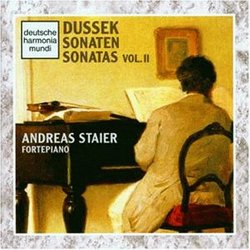| All Artists: Staier, Dussek Title: Staier Plays Dussek Members Wishing: 0 Total Copies: 0 Label: Deutsche Harmonia Mundi Release Date: 10/10/1995 Genres: Special Interest, Classical Styles: Forms & Genres, Sonatas, Historical Periods, Classical (c.1770-1830) Number of Discs: 1 SwapaCD Credits: 1 UPC: 054727733420 |
Search - Staier, Dussek :: Staier Plays Dussek
CD Details |
CD ReviewsStaier does not fully understand the Dussek style James Irsay | New York City | 05/26/2003 (3 out of 5 stars) "It is all very well to hear the sonatas of the great JL Dussek performed on a period instrument. After all, he was the first pianist to really make the piano "sing", and was an early exponent of the cantabile style. Of course, were Dussek to hear a modern Steinway piano, he would take his own pianos and make a bonfire out of them. His music is much more successful on today's pianos.Staier's period instrument is revealing, and his performance is valuable in a historical, if not musical, sense. As for his interpretation and approach to the keyboard, he misses the mark. It is impossible to imagine that Dussek ever produced an ugly sound from even the clangy Broadwoods of his day. Dussek's fellow Bohemian, JW Tomaschek, in his autobiography, writes of the general "Ahh!" murmured by the audience as soon as Dussek began to play. Staier's playing might have brought forth a general "Oy!"In print, Dussek's sonatas show a plethora of dynamic indications, one of the most common being "rf" or "rinf", for rinforzando... an indication to stress the note or passage under consideration. Staier constantly mistakes this marking for a rough accent, and produces a sound that would certainly inspire Chopin, and probably Dussek as well, to ask, "Do I hear a dog barking?". Staier's roughness is amplified on the somewhat brash-sounding instrument he plays, which demands more tonal control than he can give.The rinforzando is the most important indication in Dussek's music, as it guides the performer in shaping phrases, in applying the "expression" for which Dussek was famous, not in sharply accenting this or that individual note. Staier ruins the overall effect of his playing, which does show spirit and some intelligence, when he sabotages the cantabile esthete with his often heavy hand. Dussek's best music is truly unjustly neglected, if not on CD, then certainly in the standard repertoire. Staier's performances of this fine and striking music make one wish that a more sensitive musician were sitting at the Broadwood (Frederic Marvin does a better job, at a modern piano), so we could hear the real cantabile style exhibited on the instrument that first produced it, to the raves of audiences everywhere."
|

